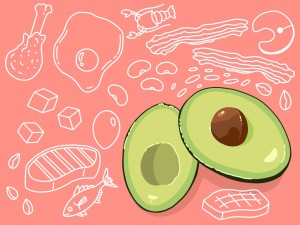Whether it’s Tex-Mex at De Neve, Asian fusion at Feast at Rieber, health-conscious options at Bruin Plate or one of the many other choices available, UCLA delivers.
If rotating menu options aren’t enough to excite your palate, customizable options like pizzas and sandwiches are available at The Study at Hedrick to satisfy the diverse tastes of every Bruin.
That is, unless you want to eat avocado.
According to The Study’s menu, avocados are considered a protein base, not an add-on. The Study sets a limit of two proteins per sandwich. This makes the avocado a high-stakes item: Choosing to include it in your sandwich limits you to a single other protein. This is a way to control costs by limiting students to a choice of meat or avocado, which are considered pricier than other sandwich components.
This claim is ludicrous, both by standards of price and nutrition. The amount of avocado in one sandwich neither costs the university enough nor contains sufficient enough protein to justify its position alongside other sandwich base options. Students paying good money for meal swipes are being underserved by this categorization. The university is anticipating high demand for avocados and cutting its costs by shortchanging students.
That means students are not getting the meal they are paying for.
To label avocado as a comparable protein to the alternative options is downright dishonest. While avocados have a high protein content for fruits – yes they are technically fruits – they pale in comparison to the other protein bases UCLA Dining Services offers. With around one tenth of the protein content of most alternatives, such as turkey or ham, and even less in some cases, it seems like a stretch to place them in the same category. A sandwich serving of chicken has 20.1 grams of protein, according to UCLA Dining. Turkey is 10.2 grams; ham and bacon are around the same. However, the serving of avocado has a measly 1.1 grams of protein. In essence, this is depriving students of the protein they paid good money for by masquerading a pricier add-on as a protein-heavy base to allow them to limit their use.
And Bruins eat a lot of avocados – 14,000 of them per month. This, along with 2,600 trays of guacamole, costs UCLA $25,000 to $30,000 per month. Given how popular avocados are on campus, you would think the serving size would reflect the cost to the student.

For example, Brianna Simmons, a third-year biology student, said she eats them three to four times per week. And Maria Hernandez, also a third-year biology student, said she doesn’t understand the avocado craze, but prepares them for social events because she knows a lot of people like them.
UCLA appears to be taking advantage of student passion for the green fruit. A build-your-own sandwich at The Study costs students one swipe, which could translate to roughly $8.
But one sandwich contains 91 calories of avocado pulp, which translates to roughly one third of an avocado. This means each avocado serving for a sandwich would cost around 50 cents, and very likely less because the university purchases its supply wholesale.
This highway robbery is comparable to premium swipe options on campus, such as certain sandwiches at Bruin Cafe or the carne asada fries at De Neve Late Night. In these cases, UCLA puts the hefty price tag of two swipes on items they consider greater in value than a single swipe. Given what a swipe is worth, it is unlikely this value truly reflects the market price of its components.
Ditto for Rendezvous boba and Late Night’s milkshakes, both of which cost a full swipe but go for much less than $8. Typical off-campus boba prices vary between $3 to $4. A student paying with BruinCard Easy Pay, preloaded cash, only spends $5.75 on a large boba, three quarters of the swipe price.
And don’t even get me started on UCLA Dining’s end-of-year swipe “deals” – which include cheap bulk goods like ramen and water bottles for far, far above their retail value.
The destruction of trust that comes with these overpriced items forces one to question the system as a whole. If UCLA is willing to sell students these items for far more than they’re worth, who’s to say they aren’t shortchanging us elsewhere?
The unwarranted restriction on our sandwiches may seem small, but little things add up. The university clearly understands this in its choice to categorize menus a certain way to minimize its costs.
Admittedly, as produce goes, avocados aren’t the cheapest. Demand is high, and seasonal conditions can limit supply. Local prices from places like Ralphs, Vons and Amazon Fresh vary from around $1 to $3 per avocado. However this is still far less than what students are charged at UCLA.
The university may claim it is providing a vegan-friendly option to students by offering avocados as a base, but students could simply choose to skip a protein base and construct a sandwich composed of add-ons alone, avocado included. This would allow for vegan options without preventing others from getting a sandwich worthy of the price they are paying.
On top of this, UCLA unnecessarily restricts students’ build-your-own sandwich options. Having a sandwich with turkey, bacon and avocado is an unfulfillable request at UCLA Dining, but something you could get at your average sandwich shop. Limiting Bruins’ options makes UCLA feel even further from home.
UCLA Dining is award-winning. It has some of the greatest dorm food in the country. But unless we collectively question the pricing of some of our favorite foods, students may be better off cooking at home – where they can have the whole avocado for a third of UCLA’s price.
